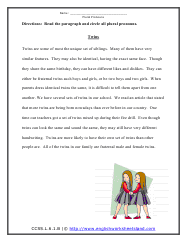Plural Pronouns Worksheets To Print:
Twins – Do they
really share thoughts and feelings?
Fresh or Not?
– Classify the type of pronoun that you will see in each sentence.
Cookie Day
– Our class was excited about making cookies for this week's snack.
The Desert
– Animals in the desert must know how to keep their bodies cool.
Cycling –
Our dad decided we should rent bikes and go for a ride along the paths.
Elephants
– Elephants are the largest land mammals. They travel together in
packs called herds.
Plants –
There are so many different types of plants that grow all over the
planet.
Deciding Whether to use Singular or Plural Pronouns
To have a great deal of impact on our readers we want to make sure to use more diverse words. If we use the same words over and over our readers will get bored. Pronouns help us achieve this. Pronouns take the place of nouns and help us present a bolder message to our readers. You will often come across instances where a pronoun can represent and individual or a group. Singular pronouns take the place of individuals, things, or concepts. Singular pronouns often can be gender specific such as the words he and she. Plural pronouns often focus on groups. There are some pronouns that are context based such as the words you and who. Choosing which form of a pronoun to use is often simple. The best way to be sure you are using the word properly is to read the sentence aloud.
Young writers often have difficulty understanding the place and usage of indefinite pronouns. These are the pronouns that do not refer to any particular person, place, or thing. The use of singular or plural forms revolves around the information that is held in the prepositional phrases. In these cases, read the sentences slow and definitely double check how you use them.
Writers will, at times, run into speed bumps with their use of pronouns because they do not pay attention to the agreement between the pronoun and antecedents of the sentence. The antecedent is a word in which the pronoun stands for. They both must match and agree in number. Prepositional phrases or clauses do not modify the number of the antecedent. If you are working with compound subjects that are joined by the word "and", they should both be plural. When working with titles you should always yield to use the singular form. The words "each" and "every" will often force the antecedent to be singular.

